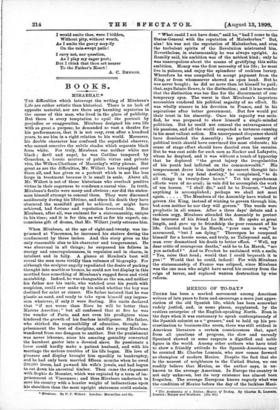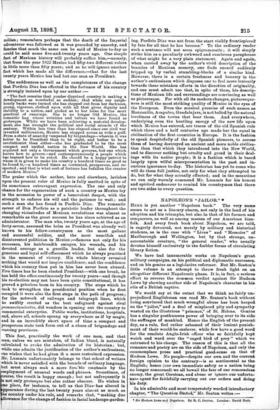MEXICO OF TO-DAY.* THERE has been a marked movement among
American writers of late years to form and encourage a more just appre- ciation of the old Spanish life, which has been somewhat rudely jostled, and, in some places, supplanted, by the restless enterprise of the English-speaking North. Even in the days when it was customary to speak contemptuously of the Spanish colonist as a " greaser," and to hold up his pro- crastination to business-like scorn, there was still evident in American literature a certain consciousness that, apart from all questions of progress, the slow and unready Spaniard showed in some respects a dignified and noble figure in the world. Among other authors who have tried to show a friendly attitude to the Spanish-American may be counted Mr. Charles Lummis, who now comes forward as champion of modern Mexico. Despite the fact that she is the nearest of neighbours to the United States, we can readily believe that Mexico, as the author says, is un- known to the average American. In Europe the country is not only unknown, but its very existence has almost been forgotten. The average European knows vaguely what was the condition of Mexico before the day of the luckless Mazi-
• The Awakening of a Nation: Mexico of To-day. By Charles E. Lammil. London : Harper and Brothers. [10s, 6d.]
milieu ; remembers perhaps that the death of the Imperial
adventurer was followed as it was preceded by anarchy, and fancies that much the same can be said of Mexico to-day as could be said some five-and-twenty years ago. One simple
fact of Mexican history will probably suffice him,—namely, that from the year 18:22 Mexico had fifty-two different rulers in little more than fifty years; and so he will ignore another fact which has made all the difference,—that for the last twenty years Mexico has had but one man as President.
The suddenness as well as the completeness of the change that Porfirio Diaz has effected in the fortunes of his country is strongly insisted upon by our author :—
" The fact remains that yonder disprized country is making a development as wonderful as sudden; that while our neigh- bourly backs were turned she has stepped out from her darkness, young, vigorous, clothed upon with all that gives dignity and stability to a nation, and girded as to her loins for the most practical of runnings. She is no longer Old Mexico, the romantic hag whose wrinkles and tatters we have found so grotesque. While we have been achieving a material develop- ment, she has wrought the political and social miracle cf the century. Within less time than has elapsed since our civil war invented millionaires, Mexico has stepped across as wide a gulf. From a state of anarchy tempered by brigandage—wherein it was better to be President than to be right, and better to be a revolutionist than either—she has graduated to be the most compact and unified nation in the New World. She has acquired not only a Government which governs, but one which knows how to govern—and contemporaneously a people which has learned how to be ruled. He should be a happy patriot to whom it is given to make his country a hundred times as good as he found it,—a hundred times as contented, prosperous, and re- spected ; and that is what sort of fortune has befallen the creator of modern Mexico."
The praise which the author, here and elsewhere, lavishes upon the present ruler of Mexico is fully merited in spite of its sometimes extravagant expression. The one and only chance for the regeneration of such a country as Mexico lay in the accession to power of a benevolent despot, with the strength to enforce his will and the patience to wait ; and such a man she has found in Porfirio Diaz. The romantic career of Don Porfirio as a patriotic leader throughout the
changing vicissitudes of Mexican revolutions was almost as remarkable as the great success he has since achieved as an administrator. The man who, twenty years ago, at the age of
forty-seven, assumed the helm as President was already well known to his fellow-countrymen as the most gallant and successful soldier, and the most unselfish and disinterested politician in Mexico ;—famous not only for his successes, his hairbreadth escapes, his wounds, and his devoted courage as a guerilla leader, but also for the generous and loyal self-effacement which he always practised in the moment of victory. His whole history revealed nothing that would not inspire confidence; and the confidence which his country then put in him has never been abused.
Five times has he been elected President—with one break, he has held the office continuously for twenty years—and though his re-election may not have been quite constitutional, it has proved a priceless boon to his country. The steps which he took to strengthen the presidential position when he first occupied it were also the first steps in the path of progress ; for the network of railways and telegraph lines, which he swiftly erected as the best safeguard against rival
pronunciarnientos, did wonders in opening out the country to commercial enterprise. Public works, institutions, hospitals,
and, above all, schools sprang up everywhere as if by magic, and in an incredibly short space of time a compact and prosperous state took form out of a chaos of brigandage and warring provinces.
This feat, practically the work of one man, and that
man, unless we are mistaken, of Indian blood, is naturally calculated to evoke the admiration of its historian ; but,
while one admits the justification of the author's enthusiasm, one wishes that he had given it a more restrained expression. Mr. Lummis unfortunately belongs to that school of writers which is never satisfied with the bounds of ordinary language, but must always seek a more fore'ble emphasis by the
mployment of unusual words and phrases. Sometimes, of purse, the result is happy enough ; but not unfrequently it not only grotesque but also rather obscure. He wishes in e place, for instance, to tell us that Dias--has altered in ppearanee daring the last twenty years almost as much as he country under his rale, and remarks that, " making due owance for the change of fashion in facial landscape-garden- ing, Porfirio Diaz was not from the start visibly frontispieced by fate for all that he has become." To the ordinary reader such a sentence will not seem epigrammatic ; it will simply strike him as a peculiarly awkward and cumbrous paraphrase of what might be a very plain statement. Again and again, when carried away by the author's vivid description of the beauties of Mexican scenery, one finds oneself suddenly tripped up by verbal stumbling-blocks of a similar kind. However, there is a certain freshness and honesty in the- author's enthusiasm which disposes one to feel more leniently towards these mistaken efforts in the direction of originality, and one must admit too that, in spite of them, his descrip- tions of Mexican life and surroundings are convincing as well as picturesque. For with all its modern changes, picturesque- ness is still the most striking quality of Mexico in the eyes of the European. Even the musical promise of such names as Manzanillo, Acapulco, Guadalajara, is not belied by the natural loveliness of the towns that bear them. And everywhere, underlying even the bustling energy of the new life upon which Mexico has entered, are traces of the old Spanish rule which three and a half centuries ago made her the equal in civilisation of the first countries in Europe. It is the fashion to speak despitefully of the old Spanish pioneers, to accuse them of having destroyed an ancient and more noble civilisa- tion than that which they introduced into the New World, and to discover nothing but cruelty and greed in their deal- ings with its native people; it is a fashion which is based largely upon wilful misrepresentation in the past and in- curious ignorance to-day. The historian has yet to come who will do them full justice, not only for what they attempted to do, but for what they actually effected; and in the meantime we can only warmly commend Mr. Lummis for his honest and spirited endeavour to remind his countrymen that there are two sides to every question.



































 Previous page
Previous page